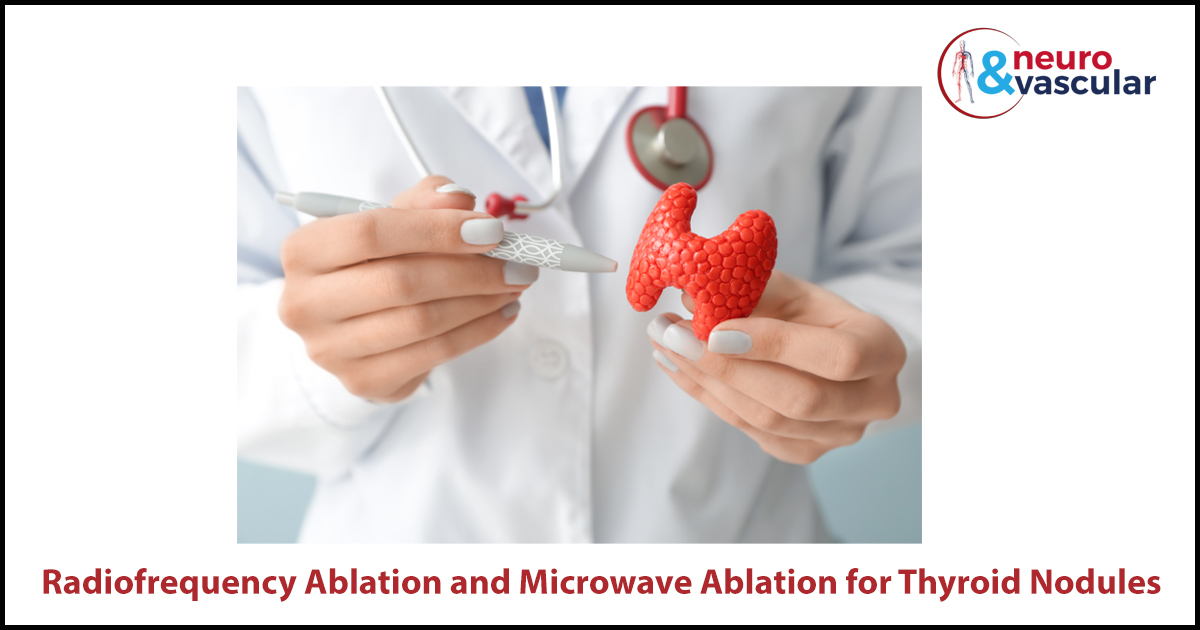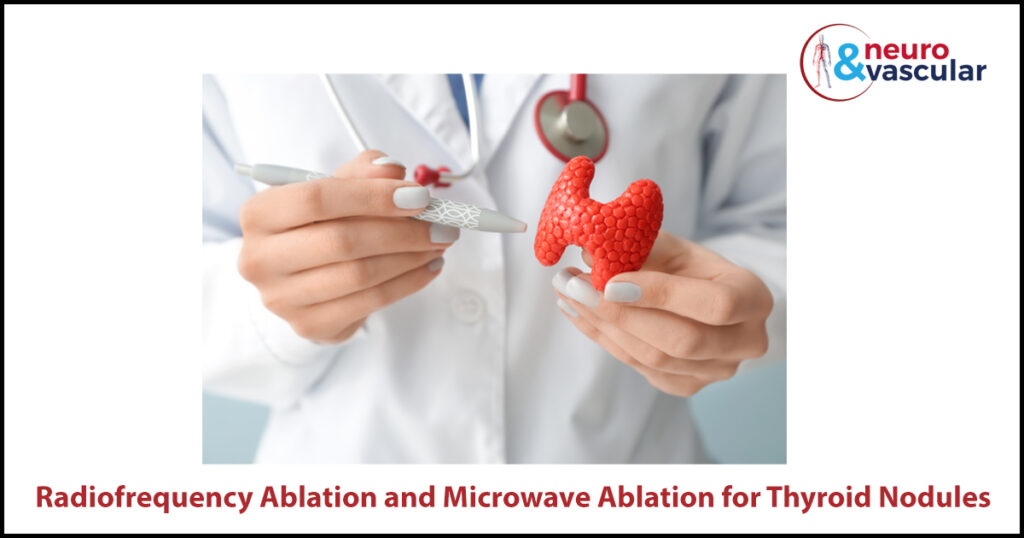
Radiofrequency Ablation and Microwave Ablation for Thyroid Nodules

Thyroid Nodules:
The Thyroid is a butterfly-shaped gland that is located on the front of the neck. The thyroid gland comprises two side lobes that are joined together in the middle by a bridge (isthmus). You cannot feel the thyroid when it is at a normal size.
Thyroid nodules are solid or fluid-filled lumps (growth) of cells on the thyroid gland. Usually don’t cause any symptoms. In rare cases, they’re cancerous. Thyroid nodules are common and found in 20–75 % of the general population and the majority of Thyroid nodules are benign, a treatment can be however in selected cases. Percutaneous ethanol injection (PEI), laser ablation (LA), radiofrequency ablation (RFA), and most recently microwave ablation(MWA) is non-surgical, minimally invasive treatments that have been developed in recent years to treat these thyroid nodules.
What are the types of Thyroid nodules?
Types of Thyroid Nodules:
There are types of thyroid nodules that aren’t cancerous:
- Toxic nodules make too much thyroid hormone. This can lead to hyperthyroidism, which makes the metabolism speed up.
- Multinodular goiters have several nodules. They may produce excess thyroid hormone and put pressure on other structures.
- Thyroid cysts are full of fluid, sometimes with other debris. They may happen after an injury.
What are the causes of thyroid nodules?
Causes for thyroid nodules:
- Thyroid tissue overgrowth
- Thyroid cyst
- Chronic inflammation of the thyroid
- Multinodular goiter
- Thyroid cancer
- Iodine deficiency
What are the signs and symptoms of thyroid nodules?
- Difficulty swallowing or breathing
- Visible or palpable swelling in your neck
- Persistent cough
- Fatigue
- Pain in your neck or jaw
- Anxiety
- Weight changes (unexplained weight loss or gain)
- Irregular heartbeat
- Hoarseness
- Changes in your voice
Diagnosis of Thyroid Nodules:
- Ultrasound Scan
- Thyroid function tests
- Blood Tests
- Fine Needle Aspiration biopsy (FNA)
What are the Advanced Treatment Available for Thyroid nodules?
Nonsurgical and minimally invasive treatment modalities, such as Radio Frequency Ablation (RFA) and Microwave Ablation (MWA) have been used to treat thyroid nodules and yield good results.
What is Radiofrequency Ablation?
Radiofrequency ablation (RFA) is a minimally invasive procedure, in this procedure tissue cells in nodules, tumors, and other growths in the body are destroyed by localized heat generation. RFA is categorized as an interventional radiology procedure. It treats conditions like liver cancer, thyroid nodules, and lung and kidney cancers.
How is RFA Procedure Performed for Thyroid nodules?
Thyroid Radio Frequency Ablation is a relatively common outpatient procedure performed on many patients around the world each year. The Procedure time is variable depending on the size and location of the nodule being treated. Most patients can typically expect the preparation and procedure to take less than one hour.
In this procedure patient will lie down comfortably on the operating table with the neck slightly extended and the patient will be awake during the procedure. This procedure is performed under local anesthesia. The Interventional Radiologist will use an ultrasound machine to locate and measure the dimensions of the thyroid nodule. Two grounding pads will be placed on the thighs. The RFA electrode will be inserted and positioned into the target nodule. The RFA system will be activated and the ablation will be monitored using real-time ultrasound imaging. The doctor will perform the procedure by moving the electrode slowly throughout the nodule. At last, the doctor will perform a final ultrasound scan to confirm the procedure is completed before removing the electrodes and grounding pads.
After the procedure patient will observed for around one hour.
Benefits of Thyroid Radiofrequency Ablation:
- A minimally invasive surgery
- It protects your healthy thyroid tissue and allows it to function normally without the need for lifetime medication.
- Less recovery time
- There is no visible scarring.
- Reduced nodule volume with a low complication rate
- Improves quality of life
Risks of Thyroid RFA:
Serious complications are rare with the RFA procedure. Side effects such as bleeding, hoarse voice (due to nerve bruising), skin burns, and infection are possible, but with RFA best practices protocols, side effects can be effectively mitigated.
What is Microwave Ablation (MWA)?
Microwave Ablation of Thyroid Nodules is a newly developed minimally invasive treatment method that has been shown to achieve superior cosmetic and symptomatic results while carrying a very low risk and side-effect profile. Microwave Thyroid Nodule Ablation aims to destroy only the thyroid nodule using heat generated by electromagnetic waves, without harming or damaging the surrounding tissue.
How is MWA Procedure Performed for Thyroid nodules?
In this MWA Procedure after confirming the benign nature of the thyroid nodule, an expert Interventional Radiologist will perform Microwave Ablation of the thyroid nodule under local anesthesia. The microwave antenna needle is inserted into the thyroid nodule to be treated using appropriate imaging (ultrasound) guidance. The microwave antenna is activated after proper placement to heat and destroy the thyroid nodule. To ensure complete ablation of the thyroid nodule, the ablation needle may need to be repositioned. At the end of the procedure, one to two small incisions on the skin are usually covered with a small bandage and no sutures. The patient is discharged within 3-4 hours after the procedure.
Benefits of Microwave Ablation:
- Minimally invasive Day Care Procedure
- Local Anesthesia
- Obviates the need for admission
- Less Morbidity
- Faster return to normal activities
- Less Trauma
- Fewer Complications
MWA has the following advantages over RFA:
- Faster treatment time
- Larger ablation zone
- Less heat sink effect
- Similar complication rate
Conclusion:
Both Radio Frequency Ablation (RFA) and Microwave Ablation (MWA) are suitable for treating thyroid nodules and show no significant differences in application duration, energy transmission, or volume reduction. However, MWA requires fewer shots to treat the whole nodule.
Frequently Asked Questions:
Q: Why not surgery for thyroid nodules?
A: Surgery is a conventional treatment option for both benign and malignant thyroid nodules. Thyroid ablation to remove the nodule instead of surgery is a minimally invasive treatment option with associated advantages.
Q: Are thyroid nodules cancerous?
A: The majority of thyroid nodules are benign, but about 2 or 3 in every 20 are cancerous. These nodules can sometimes produce too much thyroid hormone, resulting in hyperthyroidism. Thyroid nodules that produce excessive amounts of thyroid hormone are almost always benign. Thyroid nodules can appear at any age, but they are most common in older adults.
Q: What are the contraindications to RFA?
A: Patients who are pregnant or patients with cardiac pacemakers should not undergo RFA. If your thyroid nodule is close to critical structures such as the nerve to the vocal cord, esophagus, or major blood vessels, you may not be a candidate for RFA.
About the Author:

Name: DR . SURESH GIRAGANI
INTERVENTIONAL RADIOLOGIST
DR. SURESH GIRAGANI CONSULTANT INTERVENTIONAL RADIOLOGIST at Apollo hospitals Jubilee Hills has more than sixteen years of clinical experience in vascular interventions with a special interest in neurovascular and peripheral vascular disease interventional procedures.